As an intern for the Coalition for Immigrant and Refugee Rights in Chicago in 2018, Lindsay Gassman, AB ’20, was assigned a job as inspiring as it was rewarding — registering new voters at naturalization ceremonies.
“Everyone was so eager to register,” Gassman recalls. “Their joy and pride were overwhelming. Some of the new citizens would take pictures with their new voter registration cards. Other people shared with me how seriously they took their right to vote and how hard they had worked to earn it.”
The experience taught Gassman the unique value of voter engagement in the electoral process, especially among populations that face disproportionate levels of voter suppression.
“There are some interests who don’t want immigrants and refugees to vote,” Gassman says. “In 2016, there was the myth that noncitizens voted in the presidential election. But, in truth, there is a long history of voter suppression, from burdensome voter ID laws to limited access to polling locations, aimed at immigrant communities. That summer showed me the importance of voter engagement to counter those tactics.”
Gassman graduated a full year early from Washington University so she could serve as a voter engagement fellow at the nonpartisan Gephardt Institute for Community and Civic Engagement for this election cycle. The challenges here are different, but no less daunting. That’s because college students, no matter the year or the location, turn out at lower rates than the general public. Add a deadly pandemic, and the charge becomes all the more complex.
“There are so many questions about changing state requirements and voter safety,” says Gassman, who studied political science and Spanish in Arts & Sciences. “Even finding a notary or a stamp can be a challenge. We’ve been helping students find the answers to these questions, so they are prepared to vote in the August primary and November general election.”
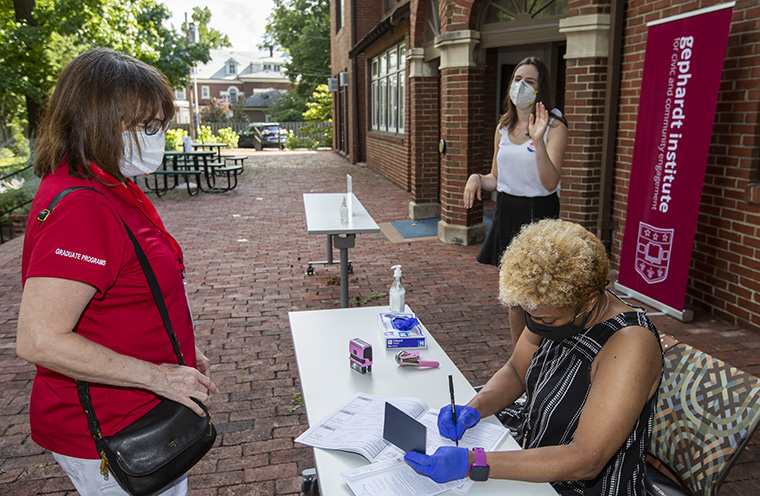
In addition, Gassman and the Gephardt team, in partnership with the Center for Social Development’s Voter Access and Engagement initiative, organized online programs such as a conversation about the power of local politics with newly elected Ferguson Mayor Ella Jones and County Prosecutor Wesley Bell and a webinar with David H. Perlmutter, MD, executive vice chancellor for medical affairs and dean of the School of Medicine, and other members of the St. Louis and the university community about the August election and Amendment 2, which would expand Medicaid in the state of Missouri. Gassman is helping faculty, academic departments and student groups develop their own programs and engagement initiatives as well.
Theresa Kouo, assistant director of civic engagement education at the Gephardt Institute, says Gassman’s knowledge of the university landscape, nuanced understanding of student attitudes and skill at building partnerships with students of different backgrounds make her a vital asset.
“As a recent graduate, Lindsay is closely connected to the student experience. She gets how to navigate the variety of channels students use to get information and has great insight on the types of programs and speakers that will resonate with students,” Kouo says. “And she cares about this community.
“When I found out she was graduating early so she could work on the election, I knew she would be very dedicated,” Kouo says. “She is exactly what we need — someone with energy and excitement who can get her peers to feel that same energy and excitement about voting.”
Gassman has sparked that enthusiasm not just through education and outreach but with poll parties and “I Voted” stickers too. This fall, she hopes to recapture the fun vibe WashU Votes created in 2018 outside the Athletic Complex where students gathered for snacks, games, giveaways and live music.
“It’s important to build a culture of celebration,” Gassman says. “I want students to say, ‘Voting is part of what it means to be a WashU student.’”
That has not always been the case. In 2014, only 15% of eligible Washington University students voted for the midterm elections. Indeed, turnout was low nationwide. Still, 19% of college students overall and 36% of the general population did vote. After that election, the Gephardt Institute stepped up and launched its comprehensive Engage Democracy initiative aimed at increasing voter registration, education and turnout. The program has been a success. The Campus Vote Project has designated Washington University a Voter-Friendly Campus. And in 2018, 42% of eligible students voted in the midterm elections, exceeding by far its 2014 rate and surpassing the national campus voting rate of 39%.
As part of Gephardt’s 2018 WashU Votes campaign, Gassman registered students at voter drives. She was thrilled to see the spike in turnout, yet despite WashU Votes’ efforts to make voting both relevant and frictionless, college students still lagged behind the general population.
“I think many students feel, ‘Yes, I have the right to vote. And I will still have the right to vote in ten years, so I’ll just do it then,’” Gassman says. “But you can never take the right to vote for granted.”
She also has met students who question whether their vote will make a difference. Gassman understands their frustration. But the answer, she says, is not staying home on Election Day. It’s stepping up the other 364 days of the year.
“Call your elected representatives, participate in a protest, canvass for an initiative or a candidate,” she says. “And take the time to educate yourself and others on the issues that matter to you. Being an engaged individual isn’t about what you do on Election Day, it’s how you live your life.”
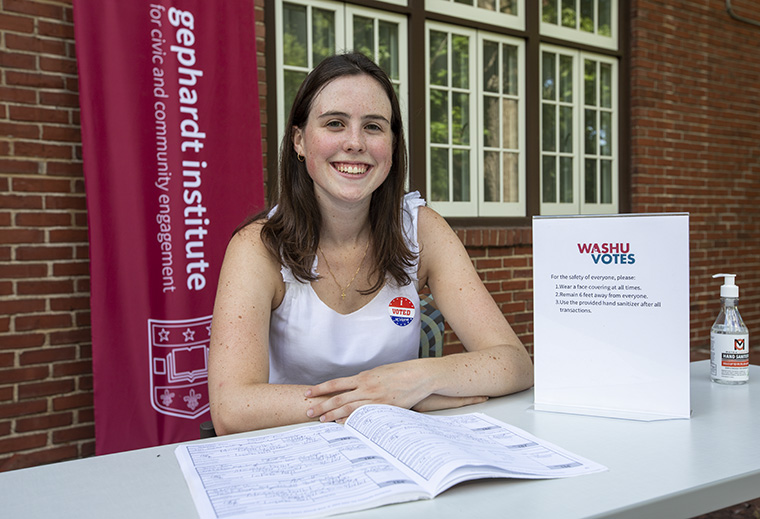
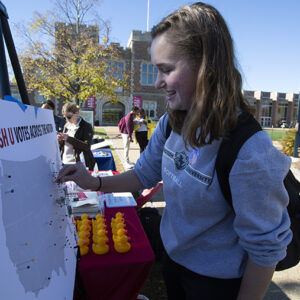
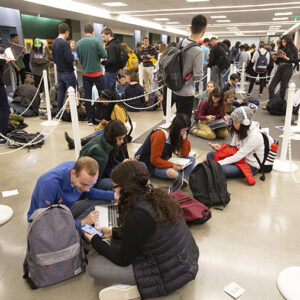
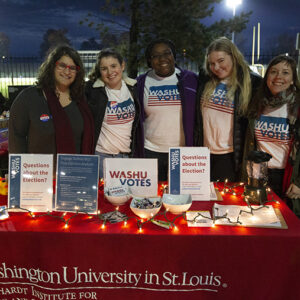
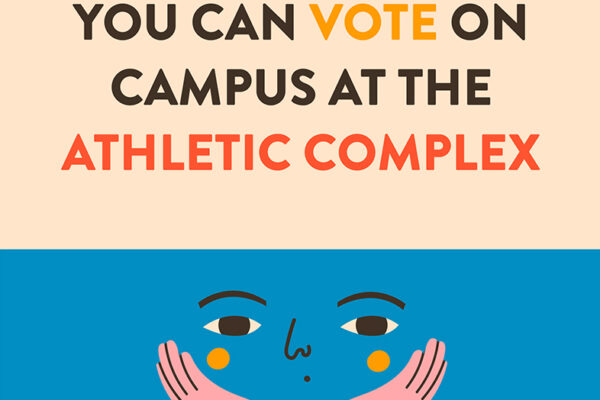
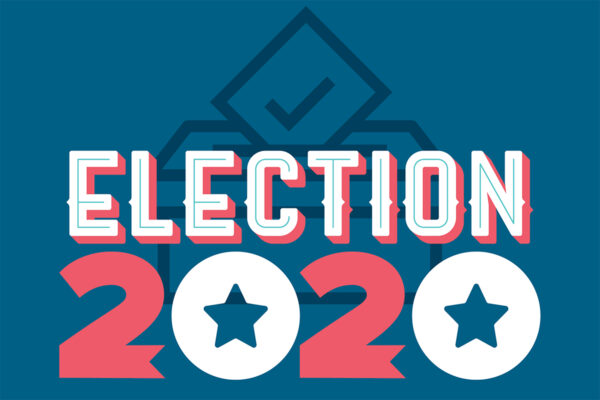
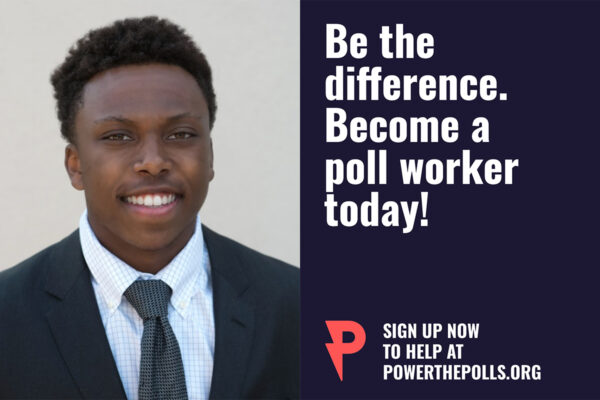
Comments and respectful dialogue are encouraged, but content will be moderated. Please, no personal attacks, obscenity or profanity, selling of commercial products, or endorsements of political candidates or positions. We reserve the right to remove any inappropriate comments. We also cannot address individual medical concerns or provide medical advice in this forum.